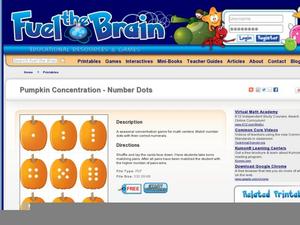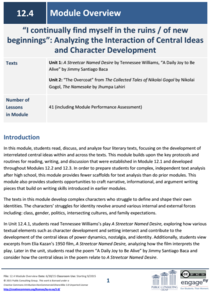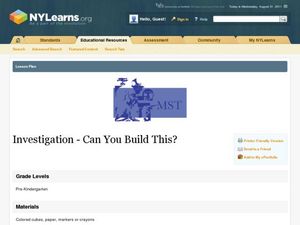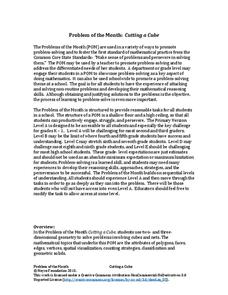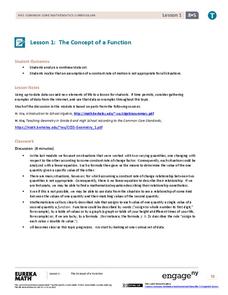National Institute of Open Schooling
Mole Concept
Learners explore atomic measurement in the first activity in a series of 36. Through readings, activities, and questions, classes review standard SI units, learn about Avogadro's constant, and use it to help them calculate moles. They...
CK-12 Foundation
Number Patterns: Square Sizes
Size up an interactive on square sizes. Scholars adjust the side length of a square to represent the next term in a geometric pattern. They answer a set of challenge questions on the pattern to complete the activity.
CK-12 Foundation
Two-Sided Stem-and-Lead Plots: Gamers
Which gender spends more time playing video games? Your classes use provided data to answer this question. They first build a two-sided stem-and-leaf plot and then use the display to look for patterns. Guiding questions help them...
Curated OER
What's Next?
Teach the class how to continue a given number pattern, and have them state a rule to explain their answer. Arithmetic sequences and related worksheets are used to reinforce the concept of numerical patterns using the nthterm.
EngageNY
Grade 12 ELA Module 1, Unit 2, Lesson 5
As class members conclude their reading of Leslie Marmon Silko's "Yellow Woman and a Beauty of the Spirit," they consider how the story of Kochininako, Yellow Woman, not only provides a satisfying ending to the narrative but also...
Curated OER
Western Civilizations, Chapter 12: The Civilization of the Renaissance
If you can't take your western civilization class to the Renaissance Faire, try this online resource to give them an idea of this era and others! While designed to accompany the Western Civilizations text, this tool can be utilized...
Curated OER
Pumpkin Concentration - Number Dots
This worksheet provides a downloadable template for a seasonal concentration game. Groups of learners match the dots on pumpkin cards. Related printables provide a template for Pumpkin Concentration with number words. Concept could be...
Curated OER
Lesson Plan 12: Writing With All Your Senses
What does an ice cream sundae sound like? Challenge young writers to move beyond visual descriptions and craft details that appeal to all five senses. The examples provided by the script in this resource show pupils how to create rich...
Curated OER
Morning Math
Get your morning mathematicians thinking with this set of warm-ups. You can do them all in one day, or separate them and have kids do one each day. They will review past concepts and sharpen newer ones with this assortment of problems...
Curated OER
Comparing and Ordering Fractions, Mixed Numbers, and Decimals
Create your own fraction kits by folding and labeling paper using fraction vocabulary. Learners then work in groups to use these in comparing and sequencing both whole numbers and fractions. They also create unit cubes and develop an...
CK-12 Foundation
Graphs of Systems of Linear Inequalities in Two Variables: President Jefferson's Octagonal Home
Mathematically complete a set of blueprints. Using eight linear inequalities, pupils create a blueprint of Thomas Jefferson's home. Individuals graph the linear inequalities and position the solution of the inequalities before...
Curated OER
Marshmallow Fun Day - math
Early learners rotate to different classroom centers and participate in six activities based on using marshmallows to review concepts learned. They make: marshmallow sculptures (geometric shapes), the shape of mittens using colored...
Curated OER
Math: Navigating the World Around Me
Young mathematicians research and discuss real world math word problems and ways in which they apply math concepts in their everyday lives. They create a storyboard of a math word problem from which they create a slide for a multi-media...
EngageNY
Grade 12 ELA Module 4: Literary Analysis
Does identity come from within, or do external forces shape it? Explore the complex identity concept with a two-unit module for 12th-grade language arts. The first unit uses A Streetcar Named Desire by Tennessee Williams and "A Daily Joy...
Curated OER
Investigation--Can You Build This?
Early learners explore shapes using colored blocks. They first get some hands-on time with the blocks and then look at beginning math concepts regarding spatial relationships. They work with a partner to build a 6-8 block tower...
Curated OER
Math Review Questions
In this problem solving worksheet, students calculate and solve 52 questions or equations having to do with a variety of math concepts and strategies.
Curated OER
Adding Up
Make addition visual in order to help beginners understand the concept. They add up beads on a string, examining an example before trying it on their own. Learners fill in addends and sums for these, and sometimes both....
Curated OER
Hopping by 2s
Hop to it! Young counters practice skip counting by two using illustrations of animals hopping from place to place. Each image shows a number sequence and scholars draw in the path as they move from number to number. Encourage them to...
Noyce Foundation
Cutting a Cube
Teach the ins and outs of the cube! A series of five K–12 level activities explore the make-up of the cube. The beginning lessons focus on the vocabulary related to the cube. Later lessons explore the possible nets that describe a cube....
Curated OER
Are You Aware?
Bring the five senses to life with a fun science experiment! Kindergartners and first graders read an explanation of the five senses, then identify which items Sophia can sense if she is blindfolded. A science explanation at the bottom...
Curated OER
Two Gentlemen of Verona by William Shakespeare
In this online interactive reading comprehension worksheet, students respond to 15 multiple choice questions based on Two Gentlemen of Verona. Students may submit their answers to be scored.
NASA
Things Are Not Always What They Seem
Science is magic that works. Magical color-changing beads and a coffee can that follows voice commands are just two examples of magic tricks that rely on science. After completing a hands-on activity and an experiment investigating the...
Physics Classroom
Acceleration
The acceleration rate of a flea jumping works out to 50 times faster than the acceleration rate of the space shuttle. Pupils apply knowledge of acceleration to dot diagrams, velocity-time tables, and word problems. They solve for...
EngageNY
The Concept of a Function
Explore functions with non-constant rates of change. The first installment of a 12-part module teaches young mathematicians about the concept of a function. They investigate instances where functions do not have a constant rate of change.






